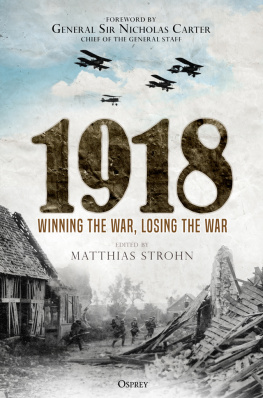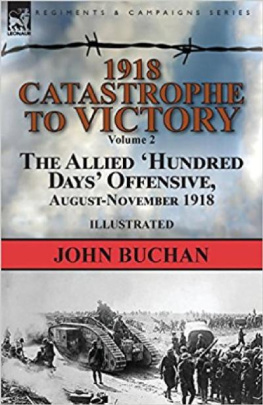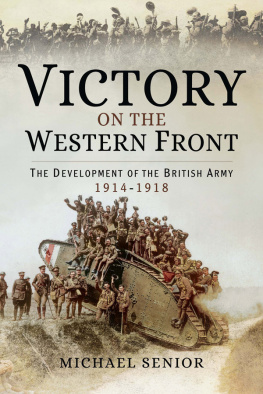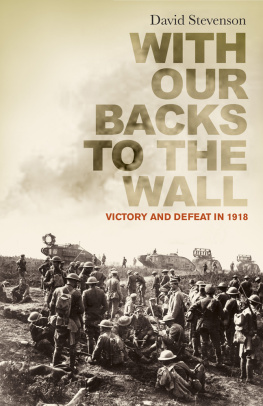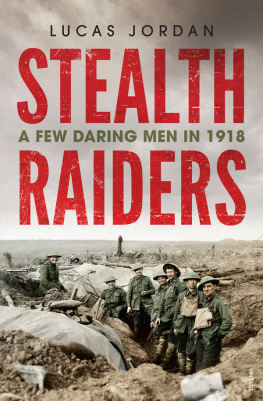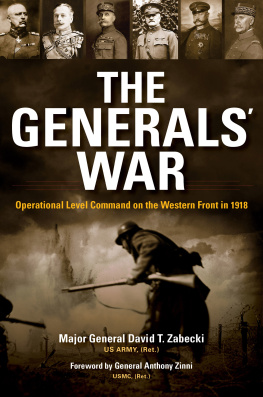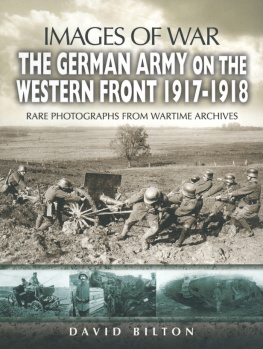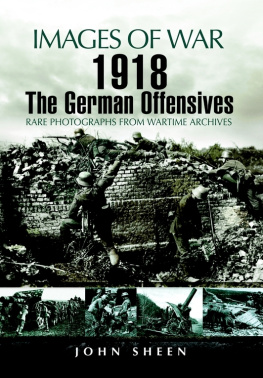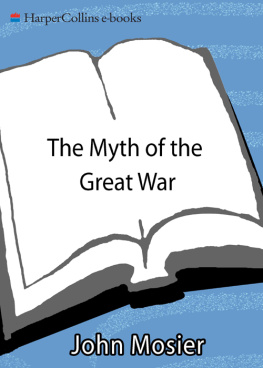
OSPREY PUBLISHING
Bloomsbury Publishing Plc
PO Box 883, Oxford, OX1 9PL, UK
1385 Broadway, 5th Floor, New York, NY 10018, USA
E-mail:
www.ospreypublishing.com
This electronic edition published in 2018 by Bloomsbury Publishing Plc
Bloomsbury is a registered trademark of Bloomsbury Publishing Plc
OSPREY is a trademark of Osprey Publishing Ltd
First published in Great Britain in 2018
Osprey Publishing Ltd, 2018
Nicholas Carter, Matthias Strohn, David T. Zabecki, David Murphy, Jonathan Boff, Mitch Yokelson, Lothar Hbelt, Robert Johnson, Michael Epkenhans, James S. Corum and Mungo Melvin have asserted their right under the Copyright, Designs and Patents Act, 1988, to be identified as Authors of this work.
All rights reserved
You may not copy, distribute, transmit, reproduce or otherwise make available this publication (or any part of it) in any form, or by any means (including without limitation electronic, digital, optical, mechanical, photocopying, printing, recording or otherwise), without the prior written permission of the publisher. Any person who does any unauthorised act in relation to this publication may be liable to criminal prosecution and civil claims for damages.
A catalogue record for this book is available from the British Library.
ISBN: 978-1-4728-2933-7 (HB)
ISBN: 978-1-4728-2934-4 (eBook)
ISBN: 978-1-4728-2935-1 (ePDF)
ISBN: 978-1-4728-2936-8 (XML)
Maps by Bounford.com
Originated by PDQ Digital Media Solutions, Bungay, UK
Front cover: (top) SE 5s over St Omer, France. (Spencer Arnold/Stringer/Getty); (bottom) German troops attack through a burning village. (IWM, Q88075)
Osprey Publishing supports the Woodland Trust, the UKs leading woodland conservation charity.
Between 2014 and 2018 our donations are being spent on their Centenary Woods project in the UK.
To find out more about our authors and books visit www.ospreypublishing.com. Here you will find our full range of publications, as well as exclusive online content, details of forthcoming events and the option to sign up for our newsletters. You can also sign up for Osprey membership, which entitles you to a discount on purchases made through the Osprey site and access to our extensive online image archive.
ACKNOWLEDGEMENTS
I cannot claim to have written or produced this book all by myself. It is the result of work carried out by many people.
First and foremost, I would like to thank the authors for their contributions. Their professionalism and ability to work towards deadlines made my role as editor an easy and enjoyable task. This book provides an overview of the last year of World War I and it does so from different angles. In addition to providing a general narrative, it also encourages the reader to engage with some of the debates that still surround the year 1918. As a consequence, the chapters sometimes differ in the analysis of certain events, actions, and personalities. This did not just happen, it was an intended outcome. All these different views combined have produced this book on the last year of the cataclysmic conflict that we call World War I.
I would like to thank Osprey Publishing and the team that has worked with me on this book, in particular Gemma Gardner and Marcus Cowper. Their professionalism is second to none and, as always, working with the team was a real pleasure. Also, my sincere thanks to the design team Stewart Larking and Beth Cole and the cartographers from Bounford.com.
The idea for the book was born when I was working at the Royal Military Academy Sandhurst and it gained real traction after my secondment to the British Armys think tank, the Centre for Historical Analysis and Conflict Research. One of my main tasks there is to support the British Armys commemoration of World War I, the so-called Operation Reflect. This book is one of the fruits of this task. I would like to thank both the RMAS and the CHACR for creating such research-friendly atmospheres in which academic output is valued more highly than physical presence behind an office desk.
My parents have not had a direct influence on this book, but without all their love and support I would not be where I am today. It is only when one becomes a parent oneself that one is able to realise this fully. The simple truth is also that parents hardly ever receive the recognition they deserve. Vielen Dank fr Alles!
Every time I start a new book, I promise my family that this time there will be no more night shifts and long hours in which I disappear into my study. Every time I fail. I cannot thank my family, especially my wife Rocio, enough for supporting me during the writing and editing period. This book and I owe you a great deal more than you imagine.
I dedicate this book to Jacob and Wilhelm. Wilhelms great-great-grandfather fought in World War I and his great-grandfather in World War II. They have all carried the same name. Members of his family fought and died all over Europe in these dark days. Wilhelms father saw military action in a far-away land. I hope that Jacob and Wilhelm will be allowed to live in peaceful times.
Vor uns liegt ein glcklich Hoffen
liegt der Zukunft goldne Zeit
steht ein ganzer Himmel offen
blht der Freiheit Seligkeit. (Theodor Krner, 1813)
CONTENTS
General Sir Nicholas Carter KCB, CBE, DSO, ADC Gen
Dr Matthias Strohn
Major General (Ret'd) Dr David T. Zabecki
Dr David Murphy
Dr Jonathan Boff
Professor Mitch Yockelson
Professor Lothar Hbelt
Dr Rob Johnson
Professor Dr Michael Epkenhans
Dr James S. Corum
Major General (Retd) Mungo Melvin CB OBE
CONTRIBUTORS
General Sir Nicholas Carter KCB, CBE, DSO, ADC Gen commissioned into The Royal Green Jackets in 1978. At Regimental Duty he has served in Northern Ireland, Cyprus, Germany, Bosnia, and Kosovo and commanded 2nd Battalion, The Royal Green Jackets, from 1998 to 2000. He attended Army Staff College, the Higher Command and Staff Course and the Royal College of Defence Studies. He was Military Assistant to the Assistant Chief of the General Staff, Colonel Army Personnel Strategy, spent a year at HQ Land Command writing the Collective Training Study, and was Director of Army Resources and Plans. He also served as Director of Plans within the US-led Combined Joint Task Force 180 in Afghanistan and spent three months in the Cross Government Iraq Planning Unit prior to the invasion of Iraq in 2003. General Carter commanded 20th Armoured Brigade in Iraq in 2004 and 6th Division in Afghanistan in 2009/10. He was then the Director General Land Warfare before becoming the Army 2020 Team Leader. He served as DCOM ISAF from October 2012 to August 2013, became Commander Land Forces in November 2013, and was appointed Chief of the General Staff in September 2014.
Dr Matthias Strohn FRHistS was educated at the universities of Mnster (Germany) and Oxford. He has lectured at Oxford University and the German Staff College (Fhrungsakademie der Bundeswehr). From 2006 until 2016 he worked as a Senior Lecturer in the Department of War Studies at the Royal Military Academy Sandhurst. He is currently on secondment to the British Armys think tank, the Centre for Historical Analysis and Conflict Research in Camberley. In addition, he is a Reader at the Humanities Research Centre at the University of Buckingham where he works in the areas of Military History and War Studies. He holds a commission in the German Army and is a member of the military attach reserve, having served on the defence attach staffs in London, Paris, and Madrid. He has published widely on 20th-century German and European military history and is an expert on the German Army in World War I and the inter-war period. He has advised British and German government bodies on the World War I centenary commemorations.

